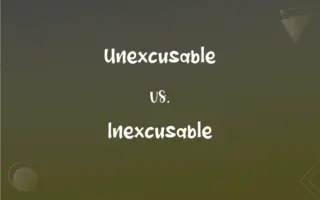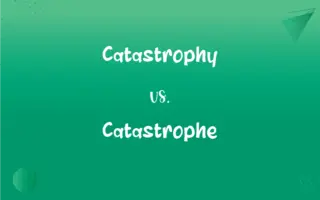Acsent vs. Accent: Mastering the Correct Spelling
Edited by Aimie Carlson || By Janet White || Published on March 15, 2024
"Acsent" is incorrect; the correct spelling is "accent," referring to distinctive pronunciation or emphasis in speech.

Which is correct: Acsent or Accent
How to spell Accent?

Acsent is Incorrect

Accent is Correct
ADVERTISEMENT
Key Differences
Use mnemonic devices like "An ACCurate ENunciaTion" to spell "accent" correctly.
Visualizing the word "accent" with an emphasized or underlined "cc" can reinforce the correct spelling.
"Accent" includes "cc" for "correct consonants."
Associate "accent" with "emphasis" in speech, helping link the correct spelling with its definition.
Think of "accent" containing "cent," a term related to value, indicating the value of correct pronunciation.
ADVERTISEMENT
Correct usage of Accent
He has a strong acsent from the southern part of the country.
He has a strong accent from the southern part of the country.
The acsent on the last syllable makes the word sound different.
The accent on the last syllable makes the word sound different.
His acsent changes slightly after living abroad for a few years.
His accent changes slightly after living abroad for a few years.
She is trying to reduce her acsent to improve her pronunciation in English.
She is trying to reduce her accent to improve her pronunciation in English.
Accent Definitions
Emphasis on a particular syllable or word in speech or music.
The accent on the second syllable changes the word's meaning.
A mark used in writing to indicate stress or pronunciation.
The é in café has an accent.
To emphasize or highlight something.
The painting accents the room's modern vibe.
A distinct way of pronouncing words, often tied to geographical region or social group.
Her British accent was noticeable.
A distinctive feature or quality.
The room's decor had an Italian accent.
The relative prominence of a particular syllable of a word by greater intensity or by variation or modulation of pitch or tone.
Vocal prominence or emphasis given to a particular syllable, word, or phrase.
One determined by the regional or social background of the speaker.
Accent Sentences
People often compliment her British accent.
His French accent makes him stand out in the group.
She has an accent that's difficult to place.
The teacher emphasized the importance of the correct accent in Spanish words.
Your accent reveals a lot about your background.
Practicing the accent can help you sound more like a native speaker.
She's working with a coach to perfect her American accent.
The accent mark indicates where the stress should be placed on the word.
The character in the play had a thick Scottish accent.
His accent has softened after years of living in a different country.
They offer classes to help reduce your accent.
Learning to mimic the local accent can be challenging but rewarding.
He enjoys listening to stories told in a Southern accent.
The accent challenge on social media showcases how people pronounce words differently.
The accent difference between the city and rural areas is striking.
The poem is beautiful, especially with her Irish accent.
Your accent becomes more noticeable when you're tired or emotional.
He's proud of his accent and the heritage it represents.
Accent Idioms & Phrases
Accent the positive
Focus on the positive aspects of something.
In every situation, it's important to accent the positive to maintain a good mood.
Under the accent
Emphasizing a specific point or detail.
The teacher instructed to read the sentence under the accent of emotion to convey the character's feelings properly.
Cut the accent
To reduce or minimize one's native accent.
For the role, he had to cut the accent to sound more American.
Lay it on with an accent
To exaggerate or emphasize something heavily.
When telling stories, he tends to lay it on with an accent, making every detail dramatic.
An accent on youth
Focusing on or prioritizing young people.
The new community center has an accent on youth, offering many programs for teenagers.
With a heavy/light accent
Having a strong or slight accent.
She speaks with a heavy French accent, making her English unique.
Change one's accent
To alter one's accent, often to fit in or for professional reasons.
To blend in more easily, he decided to change his accent.
Speak without an accent
Speaking in a manner that does not reveal one's regional or foreign background.
He's learned to speak English so well that he speaks without an accent.
An accent piece
In design, an item that stands out and draws attention.
The brightly colored vase served as an accent piece in the otherwise neutral room.
A touch of accent
A slight hint of an accent in one's speech.
There's just a touch of an accent in her speech, revealing her foreign roots.
Put an accent on
To emphasize or give importance to something.
The company decided to put an accent on customer satisfaction in their new policy.
Accent adaptation
The process of adjusting one's accent to match the speaking habits of a surrounding community.
After moving abroad, he went through accent adaptation to better fit in with the locals.
The right accent
The appropriate or desirable way of speaking or behaving.
Wearing a suit to the interview added the right accent to his professional image.
Accent versus dialect
Discussing the differences between accents and dialects.
In linguistics, the conversation often turns to accent versus dialect, exploring how they influence communication.
Have an accent for something
To have a particular affinity or talent for something.
She has an accent for languages, picking them up easily.
The accent of authority
Speaking in a way that commands respect and attention.
She delivered her speech with the accent of authority, captivating her audience.
Throw an accent
To suddenly speak with a noticeable accent.
During the play, he would throw an accent to signify a change in character.
Without accent
Speaking in a way that is clear and without a discernible accent.
Her ability to speak without accent impressed the language examiners.
FAQs
What is the pronunciation of accent?
The pronunciation of accent is /ˈæk.sɛnt/ in American English.
What is the verb form of accent?
The verb form of accent is "accentuate" or "to accent."
Why is it called accent?
It is called an accent because the term originates from the Latin word "accentus," meaning "tone, signal, or intensity," which describes variations in pitch, tone, and pronunciation in speech.
What is the root word of accent?
The root word of accent is the Latin word "accentus," which comes from "ad-" meaning "to" and "cantus" meaning "sing."
What is the plural form of accent?
The plural form is "accents."
Which vowel is used before accent?
The vowel "e" is used before the "c" in accent.
Which preposition is used with accent?
The preposition "with" is commonly used with accent, as in "speaking with an accent."
What is the singular form of accent?
The singular form is "accent."
Is accent an adverb?
No, accent is not an adverb.
Is accent a negative or positive word?
Accent is neutral; it is neither inherently negative nor positive.
Is the word accent imperative?
The word "accent" can be used in imperative sentences (e.g., "Accent the first syllable"), but it is not imperative by nature.
Which conjunction is used with accent?
Conjunctions like "and" or "but" can be used with accent, depending on the context.
Which article is used with accent?
Both the definite article "the" and the indefinite article "an" can be used with accent, depending on the context.
How many syllables are in accent?
There are two syllables in the word "accent."
What is a stressed syllable in accent?
The first syllable, "ac," is the stressed syllable in the word "accent."
What is the opposite of accent?
The opposite of accent in terms of pronunciation might be "monotone" or "uniform pronunciation."
What is the third form of accent?
The third form for a verb would be "accented" (past participle).
Is accent an abstract noun?
Yes, accent can be considered an abstract noun as it refers to a quality of speech that cannot be physically touched.
Is accent a collective noun?
No, accent is not typically considered a collective noun.
How do we divide accent into syllables?
Accent is divided into syllables as "ac-cent."
What is another term for accent?
Another term for accent could be "pronunciation" or "inflection."
What is the first form of accent?
The first form is "accent" as a noun or base verb.
What is the second form of accent?
The second form in verb tenses would still be "accent" (simple past can also be "accented").
Is accent a noun or adjective?
Accent is primarily a noun.
Is accent a vowel or consonant?
The term "accent" itself is neither a vowel nor a consonant; it is a noun.
Is the accent term a metaphor?
The term can be used metaphorically in certain contexts, but it is not inherently a metaphor.
What part of speech is accent?
Accent is a noun and can also be used as a verb (to accent/accentuate).
How is accent used in a sentence?
Accent is used to denote a distinctive mode of pronunciation, as in "She spoke with a British accent."
Is accent a countable noun?
Yes, accent is a countable noun (e.g., different accents can be counted).
Which determiner is used with accent?
Determiners like "an," "the," "your," or "my" can be used with accent, depending on the context.
About Author
Written by
Janet WhiteJanet White has been an esteemed writer and blogger for Difference Wiki. Holding a Master's degree in Science and Medical Journalism from the prestigious Boston University, she has consistently demonstrated her expertise and passion for her field. When she's not immersed in her work, Janet relishes her time exercising, delving into a good book, and cherishing moments with friends and family.
Edited by
Aimie CarlsonAimie Carlson, holding a master's degree in English literature, is a fervent English language enthusiast. She lends her writing talents to Difference Wiki, a prominent website that specializes in comparisons, offering readers insightful analyses that both captivate and inform.


























































